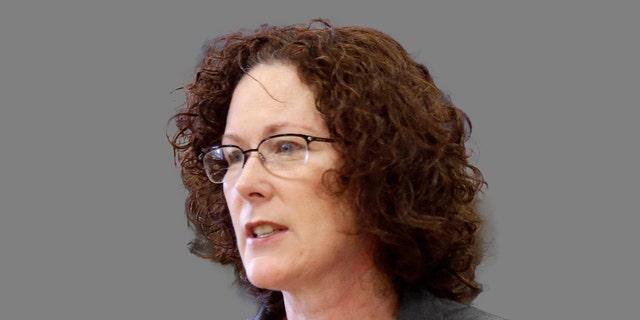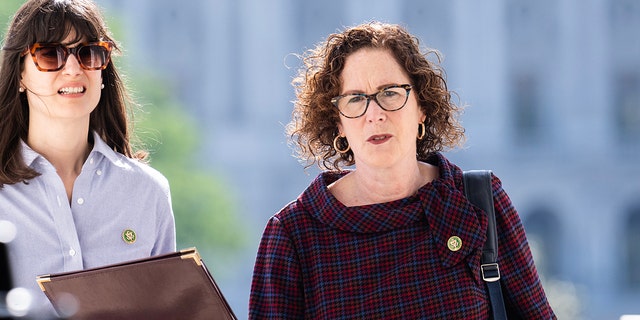Democrat Rep Hoyle received campaign donations from cannabis entrepreneurs who applied for grant she oversaw
Freshman Rep. Val Hoyle, D-Ore., accepted congressional campaign donations from a handful of cannabis entrepreneurs who were awarded a taxpayer-funded grant she oversaw during her tenure as the commissioner of Oregon’s Bureau of Labor and Industries (BOLI) last year.
In April 2022, Federal Election Commission (FEC) records showed that Laura Vega – a co-founder of the nonprofit ENDVR who, according to Portland-based Willamette Week, “founded a cannabis products company and served on an array of cannabis advisory bodies” – made a $1,000 donation to Hoyle’s campaign.
The donation to Hoyle’s congressional campaign by Vega, who co-founded ENDVR alongside La Mota CEO Rosa Cazares in late 2021, came just one week after ENDVR received non-profit status by the IRS and two weeks before the nonprofit submitted a grant application to the BOLI to establish an apprenticeship program.
Self-described on its website as “a trade and education trust formed by the industry for the industry,” ENDVR claims to prepare “motivated individuals to thrive in the careers of the future.”
OREGON GOV. TINA KOTEK BEGINS TALKS WITH LAWMAKERS TO END 3-WEEK-OLD REPUBLICAN-LED BOYCOTT
Hoyle said she remembers speaking with Vega prior to the application period, but Vega said otherwise, according to Willamette Week.
The local outlet reported, “Hoyle told WW in a phone call that she remembers speaking to Vega about the apprenticeship prior to the application period, but can’t recall if she ever spoke to Cazares. (Vega says she did not speak with Hoyle.)”
FEC records also revealed that Cazares and Aaron Mitchell, who, together, co-founded the cannabis dispensary chain La Mota, donated to Hoyle’s congressional campaign in late April 2022. Combined, the pair gave $5,800 – the legal maximum donation.
Mitchell additionally gave $20,000 to Hoyle’s BOLI campaign fund in June 2021, but that contribution was later returned after Hoyle decided to make a run for Congress.
“I’ve returned all campaign contributions from La Mota owners and won’t be taking any additional funds from them,” Hoyle said, according to Portland’s KOIN.
Despite returning the $20,000 Mitchell contributed to her state campaign fund in 2021, FEC records do not yet show that Hoyle have returned the $6,800 in congressional campaign donations she received from Vega, Cazares and Mitchell.
In Vega’s contribution to Hoyle’s congressional campaign – her only donation to a federal candidate in 2022 and the only federal donation of its size – she listed her address as being in Hillsboro, Oregon, which is well outside of Hoyle’s district.
In July 2022, Vega testified before then-Oregon BOLI Commissioner Hoyle and the Oregon State Apprenticeship and Training Council in favor of a $554,000 taxpayer-funded grant to establish an apprenticeship program for ENDVR.
In rejecting the grant, council members, according to Willamette Week, expressed “skepticism about ENDVR’s high personnel costs – $97,000 a year for Vega alone – and how so few graduates, only four, would actually be trained.”

“I’ve read this I don’t know how many times, and I’m baffled as a taxpayer how you can expect half a million dollars to support four people being trained,” council member Evan Stuart said at the time, the outlet noted. “I don’t even know how this got through the committee.”
DEM SENATOR SLAMS ‘GREATER IDAHO’ MOVEMENT TO ABSORB CONSERVATIVE RURAL COUNTIES FROM LIBERAL OREGON
Defending the nonprofit and its quest to receive funds from the state, Hoyle suggested a stronger proposal was needed and told Vega at the meeting, “I look forward to seeing you in a month and being able to support this.”
A month later, in August 2022, Vega testified once more, and the $554,990 grant was awarded unanimously to the nonprofit by the Oregon BOLI. The ENDVR grant was the largest of the 10 grants issued during that round of funding, even though other grants went to educational institutions like Chemeketa Community College.
Amid the council’s approval of the grant, Willamette Week reported that Hoyle vouched for ENDVR’s request and considered it to be an “important investment.”
The grant was awarded to ENDVR based on its application pledge to create an apprenticeship program for “botanical extractionists” – individuals who extract chemical compounds from the cannabis plant. At the time, Willamette Week reported that ENDVR “had no evident track record in job training.”
In a statement to Fox News Digital, a Hoyle campaign spokesperson said, “Knowing what we know now, ENDVR wasn’t the right partner to help professionalize and diversify the cannabis industry through apprenticeship programs.”
“Representative Hoyle wasn’t aware of any federal or state tax complaints against La Mota and would have never accepted campaign contributions if that was the case,” the spokesperson added. “All campaign contributions have been returned.”
Online, ENDVR lists its registered address as a small office space in a storage facility between a U-Haul rental and an automotive repair shop located at 16501 NW Twin Oaks Drive Beaverton, Oregon, 97006. On the nonprofit application, however, Vega listed unit 102A as the specific unit, although 102A does not exist at the address. On the business application, Vega listed unit 103A as the business address.
The half-million-dollar grant was later canceled by Oregon Labor Commissioner Christina Stephenson after Willamette Week issued a story on “$3 million in federal and state tax liens issued against [Cazares and Mitchell] and their companies in recent years, and detailed 30 lawsuits filed in Oregon circuit courts, many alleging unpaid bills.”

“You are hereby directed to immediately cease all grant-related activities and expenditures unless otherwise directed in writing by BOLI,” agency grants manager Kiely Corti wrote in an email to the nonprofit. “ENDVR must return all currently unexpended funds…BOLI will not disburse any additional funds.”
However, under federal law, ENDVR could not have registered its apprenticeship program with the federal government because cannabis is still categorized as a Schedule 1 controlled substance, the outlet pointed out.
After the grant was revoked, Hoyle, who now represents Oregon’s 4th Congressional District, admitted “the grant was miscategorized” as an apprenticeship and suggested that she would fund such a program again in the future.
“Based on the information provided in their application and what we were aware of at the time, it was the exact type of program we wanted to put Future Ready Oregon funds to,” she said, according to the outlet.
Read the full article Here


